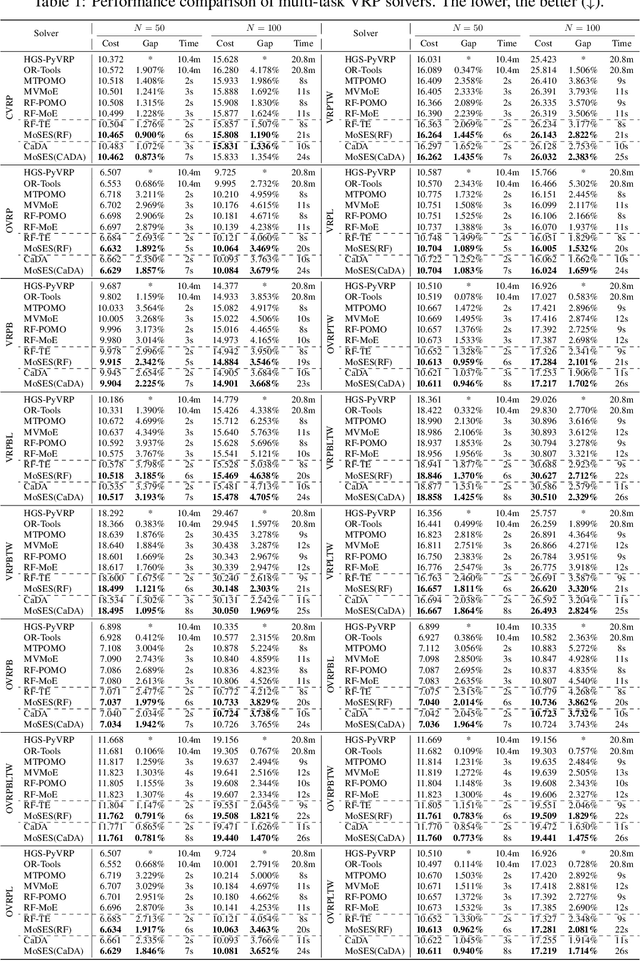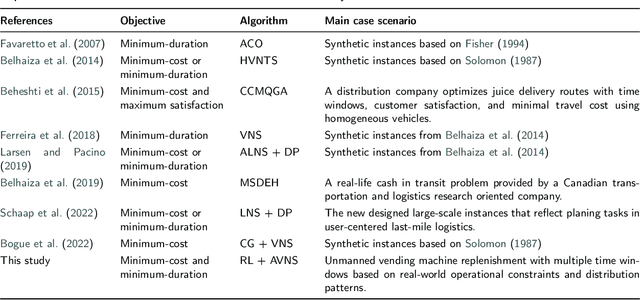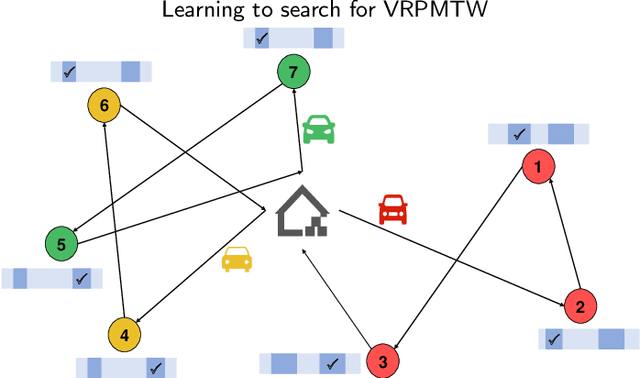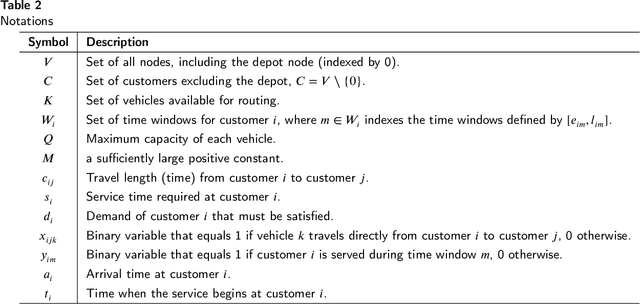Zhiguang Cao
READY: Reward Discovery for Meta-Black-Box Optimization
Jan 29, 2026Abstract:Meta-Black-Box Optimization (MetaBBO) is an emerging avenue within Optimization community, where algorithm design policy could be meta-learned by reinforcement learning to enhance optimization performance. So far, the reward functions in existing MetaBBO works are designed by human experts, introducing certain design bias and risks of reward hacking. In this paper, we use Large Language Model~(LLM) as an automated reward discovery tool for MetaBBO. Specifically, we consider both effectiveness and efficiency sides. On effectiveness side, we borrow the idea of evolution of heuristics, introducing tailored evolution paradigm in the iterative LLM-based program search process, which ensures continuous improvement. On efficiency side, we additionally introduce multi-task evolution architecture to support parallel reward discovery for diverse MetaBBO approaches. Such parallel process also benefits from knowledge sharing across tasks to accelerate convergence. Empirical results demonstrate that the reward functions discovered by our approach could be helpful for boosting existing MetaBBO works, underscoring the importance of reward design in MetaBBO. We provide READY's project at https://anonymous.4open.science/r/ICML_READY-747F.
DRAGON: LLM-Driven Decomposition and Reconstruction Agents for Large-Scale Combinatorial Optimization
Jan 10, 2026Abstract:Large Language Models (LLMs) have recently shown promise in addressing combinatorial optimization problems (COPs) through prompt-based strategies. However, their scalability and generalization remain limited, and their effectiveness diminishes as problem size increases, particularly in routing problems involving more than 30 nodes. We propose DRAGON, which stands for Decomposition and Reconstruction Agents Guided OptimizatioN, a novel framework that combines the strengths of metaheuristic design and LLM reasoning. Starting from an initial global solution, DRAGON autonomously identifies regions with high optimization potential and strategically decompose large-scale COPs into manageable subproblems. Each subproblem is then reformulated as a concise, localized optimization task and solved through targeted LLM prompting guided by accumulated experiences. Finally, the locally optimized solutions are systematically reintegrated into the original global context to yield a significantly improved overall outcome. By continuously interacting with the optimization environment and leveraging an adaptive experience memory, the agents iteratively learn from feedback, effectively coupling symbolic reasoning with heuristic search. Empirical results show that, unlike existing LLM-based solvers limited to small-scale instances, DRAGON consistently produces feasible solutions on TSPLIB, CVRPLIB, and Weibull-5k bin packing benchmarks, and achieves near-optimal results (0.16% gap) on knapsack problems with over 3M variables. This work shows the potential of feedback-driven language agents as a new paradigm for generalizable and interpretable large-scale optimization.
Bridging Synthetic and Real Routing Problems via LLM-Guided Instance Generation and Progressive Adaptation
Nov 13, 2025Abstract:Recent advances in Neural Combinatorial Optimization (NCO) methods have significantly improved the capability of neural solvers to handle synthetic routing instances. Nonetheless, existing neural solvers typically struggle to generalize effectively from synthetic, uniformly-distributed training data to real-world VRP scenarios, including widely recognized benchmark instances from TSPLib and CVRPLib. To bridge this generalization gap, we present Evolutionary Realistic Instance Synthesis (EvoReal), which leverages an evolutionary module guided by large language models (LLMs) to generate synthetic instances characterized by diverse and realistic structural patterns. Specifically, the evolutionary module produces synthetic instances whose structural attributes statistically mimics those observed in authentic real-world instances. Subsequently, pre-trained NCO models are progressively refined, firstly aligning them with these structurally enriched synthetic distributions and then further adapting them through direct fine-tuning on actual benchmark instances. Extensive experimental evaluations demonstrate that EvoReal markedly improves the generalization capabilities of state-of-the-art neural solvers, yielding a notable reduced performance gap compared to the optimal solutions on the TSPLib (1.05%) and CVRPLib (2.71%) benchmarks across a broad spectrum of problem scales.
Multi-Task Vehicle Routing Solver via Mixture of Specialized Experts under State-Decomposable MDP
Oct 24, 2025



Abstract:Existing neural methods for multi-task vehicle routing problems (VRPs) typically learn unified solvers to handle multiple constraints simultaneously. However, they often underutilize the compositional structure of VRP variants, each derivable from a common set of basis VRP variants. This critical oversight causes unified solvers to miss out the potential benefits of basis solvers, each specialized for a basis VRP variant. To overcome this limitation, we propose a framework that enables unified solvers to perceive the shared-component nature across VRP variants by proactively reusing basis solvers, while mitigating the exponential growth of trained neural solvers. Specifically, we introduce a State-Decomposable MDP (SDMDP) that reformulates VRPs by expressing the state space as the Cartesian product of basis state spaces associated with basis VRP variants. More crucially, this formulation inherently yields the optimal basis policy for each basis VRP variant. Furthermore, a Latent Space-based SDMDP extension is developed by incorporating both the optimal basis policies and a learnable mixture function to enable the policy reuse in the latent space. Under mild assumptions, this extension provably recovers the optimal unified policy of SDMDP through the mixture function that computes the state embedding as a mapping from the basis state embeddings generated by optimal basis policies. For practical implementation, we introduce the Mixture-of-Specialized-Experts Solver (MoSES), which realizes basis policies through specialized Low-Rank Adaptation (LoRA) experts, and implements the mixture function via an adaptive gating mechanism. Extensive experiments conducted across VRP variants showcase the superiority of MoSES over prior methods.
Hybrid-Balance GFlowNet for Solving Vehicle Routing Problems
Oct 06, 2025Abstract:Existing GFlowNet-based methods for vehicle routing problems (VRPs) typically employ Trajectory Balance (TB) to achieve global optimization but often neglect important aspects of local optimization. While Detailed Balance (DB) addresses local optimization more effectively, it alone falls short in solving VRPs, which inherently require holistic trajectory optimization. To address these limitations, we introduce the Hybrid-Balance GFlowNet (HBG) framework, which uniquely integrates TB and DB in a principled and adaptive manner by aligning their intrinsically complementary strengths. Additionally, we propose a specialized inference strategy for depot-centric scenarios like the Capacitated Vehicle Routing Problem (CVRP), leveraging the depot node's greater flexibility in selecting successors. Despite this specialization, HBG maintains broad applicability, extending effectively to problems without explicit depots, such as the Traveling Salesman Problem (TSP). We evaluate HBG by integrating it into two established GFlowNet-based solvers, i.e., AGFN and GFACS, and demonstrate consistent and significant improvements across both CVRP and TSP, underscoring the enhanced solution quality and generalization afforded by our approach.
Instance Generation for Meta-Black-Box Optimization through Latent Space Reverse Engineering
Sep 19, 2025Abstract:To relieve intensive human-expertise required to design optimization algorithms, recent Meta-Black-Box Optimization (MetaBBO) researches leverage generalization strength of meta-learning to train neural network-based algorithm design policies over a predefined training problem set, which automates the adaptability of the low-level optimizers on unseen problem instances. Currently, a common training problem set choice in existing MetaBBOs is well-known benchmark suites CoCo-BBOB. Although such choice facilitates the MetaBBO's development, problem instances in CoCo-BBOB are more or less limited in diversity, raising the risk of overfitting of MetaBBOs, which might further results in poor generalization. In this paper, we propose an instance generation approach, termed as \textbf{LSRE}, which could generate diverse training problem instances for MetaBBOs to learn more generalizable policies. LSRE first trains an autoencoder which maps high-dimensional problem features into a 2-dimensional latent space. Uniform-grid sampling in this latent space leads to hidden representations of problem instances with sufficient diversity. By leveraging a genetic-programming approach to search function formulas with minimal L2-distance to these hidden representations, LSRE reverse engineers a diversified problem set, termed as \textbf{Diverse-BBO}. We validate the effectiveness of LSRE by training various MetaBBOs on Diverse-BBO and observe their generalization performances on either synthetic or realistic scenarios. Extensive experimental results underscore the superiority of Diverse-BBO to existing training set choices in MetaBBOs. Further ablation studies not only demonstrate the effectiveness of design choices in LSRE, but also reveal interesting insights on instance diversity and MetaBBO's generalization.
SHIELD: Multi-task Multi-distribution Vehicle Routing Solver with Sparsity and Hierarchy
Jun 11, 2025Abstract:Recent advances toward foundation models for routing problems have shown great potential of a unified deep model for various VRP variants. However, they overlook the complex real-world customer distributions. In this work, we advance the Multi-Task VRP (MTVRP) setting to the more realistic yet challenging Multi-Task Multi-Distribution VRP (MTMDVRP) setting, and introduce SHIELD, a novel model that leverages both sparsity and hierarchy principles. Building on a deeper decoder architecture, we first incorporate the Mixture-of-Depths (MoD) technique to enforce sparsity. This improves both efficiency and generalization by allowing the model to dynamically select nodes to use or skip each decoder layer, providing the needed capacity to adaptively allocate computation for learning the task/distribution specific and shared representations. We also develop a context-based clustering layer that exploits the presence of hierarchical structures in the problems to produce better local representations. These two designs inductively bias the network to identify key features that are common across tasks and distributions, leading to significantly improved generalization on unseen ones. Our empirical results demonstrate the superiority of our approach over existing methods on 9 real-world maps with 16 VRP variants each.
Learning to Search for Vehicle Routing with Multiple Time Windows
May 29, 2025



Abstract:In this study, we propose a reinforcement learning-based adaptive variable neighborhood search (RL-AVNS) method designed for effectively solving the Vehicle Routing Problem with Multiple Time Windows (VRPMTW). Unlike traditional adaptive approaches that rely solely on historical operator performance, our method integrates a reinforcement learning framework to dynamically select neighborhood operators based on real-time solution states and learned experience. We introduce a fitness metric that quantifies customers' temporal flexibility to improve the shaking phase, and employ a transformer-based neural policy network to intelligently guide operator selection during the local search. Extensive computational experiments are conducted on realistic scenarios derived from the replenishment of unmanned vending machines, characterized by multiple clustered replenishment windows. Results demonstrate that RL-AVNS significantly outperforms traditional variable neighborhood search (VNS), adaptive VNS (AVNS), and state-of-the-art learning-based heuristics, achieving substantial improvements in solution quality and computational efficiency across various instance scales and time window complexities. Particularly notable is the algorithm's capability to generalize effectively to problem instances not encountered during training, underscoring its practical utility for complex logistics scenarios.
Meta-Black-Box-Optimization through Offline Q-function Learning
May 04, 2025Abstract:Recent progress in Meta-Black-Box-Optimization (MetaBBO) has demonstrated that using RL to learn a meta-level policy for dynamic algorithm configuration (DAC) over an optimization task distribution could significantly enhance the performance of the low-level BBO algorithm. However, the online learning paradigms in existing works makes the efficiency of MetaBBO problematic. To address this, we propose an offline learning-based MetaBBO framework in this paper, termed Q-Mamba, to attain both effectiveness and efficiency in MetaBBO. Specifically, we first transform DAC task into long-sequence decision process. This allows us further introduce an effective Q-function decomposition mechanism to reduce the learning difficulty within the intricate algorithm configuration space. Under this setting, we propose three novel designs to meta-learn DAC policy from offline data: we first propose a novel collection strategy for constructing offline DAC experiences dataset with balanced exploration and exploitation. We then establish a decomposition-based Q-loss that incorporates conservative Q-learning to promote stable offline learning from the offline dataset. To further improve the offline learning efficiency, we equip our work with a Mamba architecture which helps long-sequence learning effectiveness and efficiency by selective state model and hardware-aware parallel scan respectively. Through extensive benchmarking, we observe that Q-Mamba achieves competitive or even superior performance to prior online/offline baselines, while significantly improving the training efficiency of existing online baselines. We provide sourcecodes of Q-Mamba at https://github.com/MetaEvo/Q-Mamba.
Island-Based Evolutionary Computation with Diverse Surrogates and Adaptive Knowledge Transfer for High-Dimensional Data-Driven Optimization
Mar 17, 2025



Abstract:In recent years, there has been a growing interest in data-driven evolutionary algorithms (DDEAs) employing surrogate models to approximate the objective functions with limited data. However, current DDEAs are primarily designed for lower-dimensional problems and their performance drops significantly when applied to large-scale optimization problems (LSOPs). To address the challenge, this paper proposes an offline DDEA named DSKT-DDEA. DSKT-DDEA leverages multiple islands that utilize different data to establish diverse surrogate models, fostering diverse subpopulations and mitigating the risk of premature convergence. In the intra-island optimization phase, a semi-supervised learning method is devised to fine-tune the surrogates. It not only facilitates data argumentation, but also incorporates the distribution information gathered during the search process to align the surrogates with the evolving local landscapes. Then, in the inter-island knowledge transfer phase, the algorithm incorporates an adaptive strategy that periodically transfers individual information and evaluates the transfer effectiveness in the new environment, facilitating global optimization efficacy. Experimental results demonstrate that our algorithm is competitive with state-of-the-art DDEAs on problems with up to 1000 dimensions, while also exhibiting decent parallelism and scalability. Our DSKT-DDEA is open-source and accessible at: https://github.com/LabGong/DSKT-DDEA.
 Add to Chrome
Add to Chrome Add to Firefox
Add to Firefox Add to Edge
Add to Edge